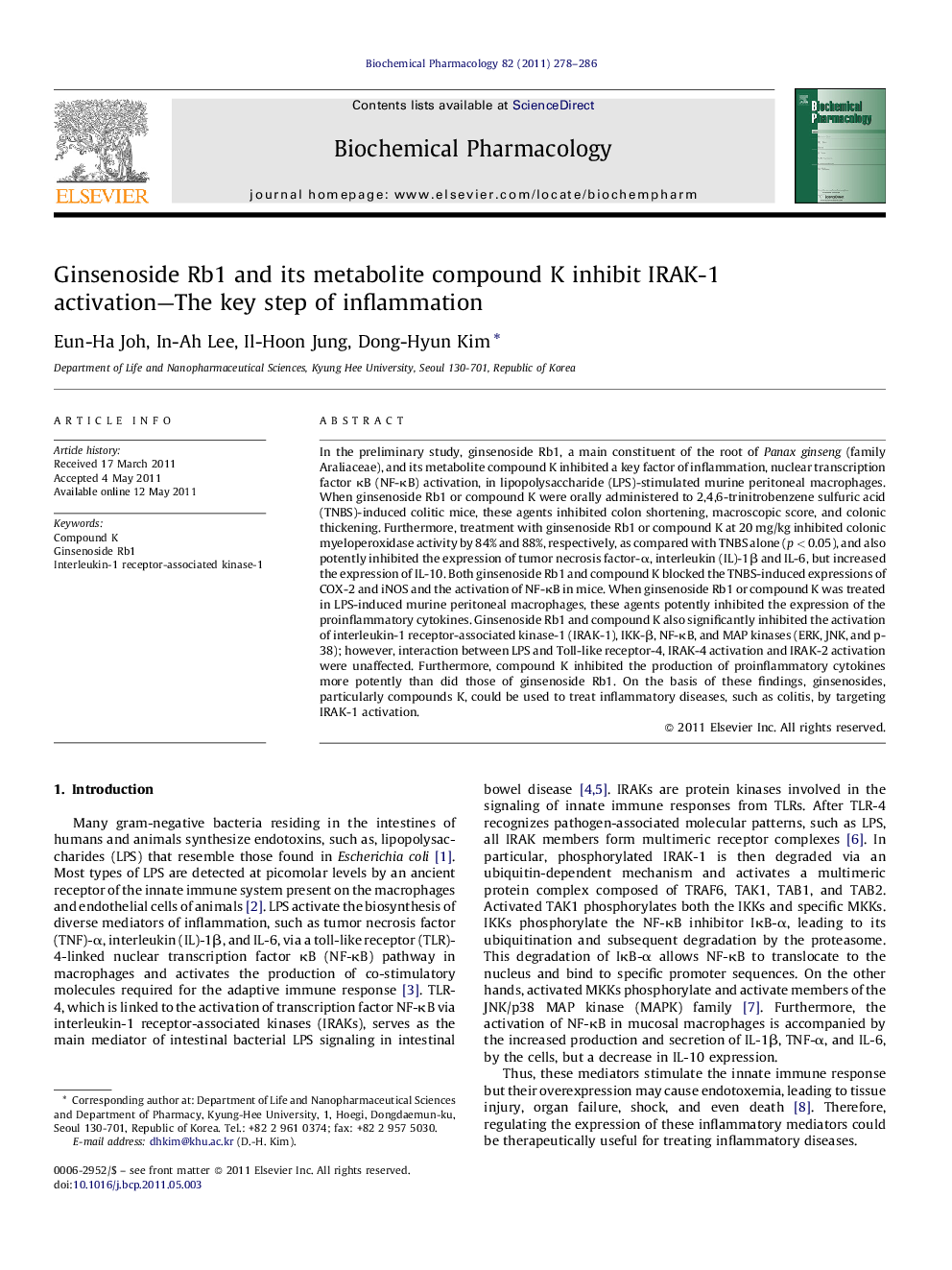| کد مقاله | کد نشریه | سال انتشار | مقاله انگلیسی | نسخه تمام متن |
|---|---|---|---|---|
| 5824054 | 1118396 | 2011 | 9 صفحه PDF | دانلود رایگان |
عنوان انگلیسی مقاله ISI
Ginsenoside Rb1 and its metabolite compound K inhibit IRAK-1 activation-The key step of inflammation
دانلود مقاله + سفارش ترجمه
دانلود مقاله ISI انگلیسی
رایگان برای ایرانیان
کلمات کلیدی
موضوعات مرتبط
علوم پزشکی و سلامت
داروسازی، سم شناسی و علوم دارویی
داروشناسی
پیش نمایش صفحه اول مقاله

چکیده انگلیسی
In the preliminary study, ginsenoside Rb1, a main constituent of the root of Panax ginseng (family Araliaceae), and its metabolite compound K inhibited a key factor of inflammation, nuclear transcription factor κB (NF-κB) activation, in lipopolysaccharide (LPS)-stimulated murine peritoneal macrophages. When ginsenoside Rb1 or compound K were orally administered to 2,4,6-trinitrobenzene sulfuric acid (TNBS)-induced colitic mice, these agents inhibited colon shortening, macroscopic score, and colonic thickening. Furthermore, treatment with ginsenoside Rb1 or compound K at 20 mg/kg inhibited colonic myeloperoxidase activity by 84% and 88%, respectively, as compared with TNBS alone (p < 0.05), and also potently inhibited the expression of tumor necrosis factor-α, interleukin (IL)-1β and IL-6, but increased the expression of IL-10. Both ginsenoside Rb1 and compound K blocked the TNBS-induced expressions of COX-2 and iNOS and the activation of NF-κB in mice. When ginsenoside Rb1 or compound K was treated in LPS-induced murine peritoneal macrophages, these agents potently inhibited the expression of the proinflammatory cytokines. Ginsenoside Rb1 and compound K also significantly inhibited the activation of interleukin-1 receptor-associated kinase-1 (IRAK-1), IKK-β, NF-κB, and MAP kinases (ERK, JNK, and p-38); however, interaction between LPS and Toll-like receptor-4, IRAK-4 activation and IRAK-2 activation were unaffected. Furthermore, compound K inhibited the production of proinflammatory cytokines more potently than did those of ginsenoside Rb1. On the basis of these findings, ginsenosides, particularly compounds K, could be used to treat inflammatory diseases, such as colitis, by targeting IRAK-1 activation.
ناشر
Database: Elsevier - ScienceDirect (ساینس دایرکت)
Journal: Biochemical Pharmacology - Volume 82, Issue 3, 1 August 2011, Pages 278-286
Journal: Biochemical Pharmacology - Volume 82, Issue 3, 1 August 2011, Pages 278-286
نویسندگان
Eun-Ha Joh, In-Ah Lee, Il-Hoon Jung, Dong-Hyun Kim,